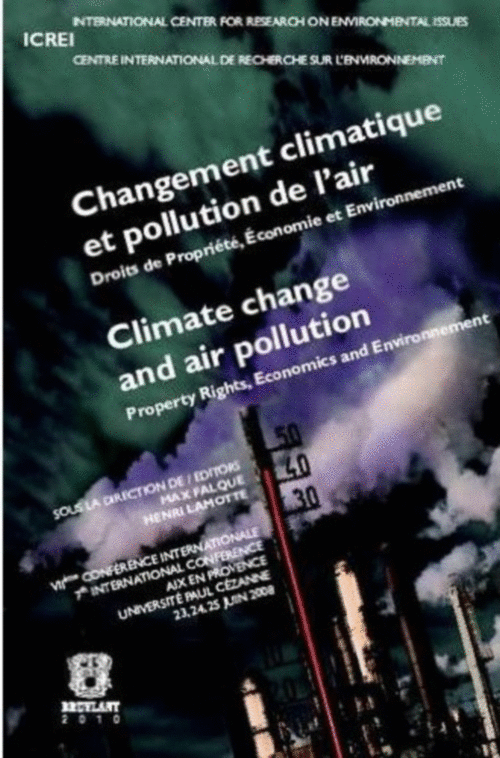VIIth International Conference
Property rights, economics and environment : Air pollution and Climate Change
June 2008
AIX-EN-PROVENCE, France
As with the six past conferences dealing with specific environmental resources our general objective is to present and evaluate theories,experiments and case studies through the lens of property rights and economic institutions that offer an alternative to “command and control” regulation in addressing difficult challenges associated with air pollution and climate change. More specifically we’ll discuss the rationale and performances of quotas trading for SO2 in the US and CO2 in Europe.
The identification of alternative and/or complementary strategies are to be conference highlights. Significant attention will be devoted to mitigation and adaptation activities that can soften the effects of climate change.
Global air pollution and climate change are quite different from other environmental resources challenges, since they are often considered as pure public goods with the following characteristics :
- non rivalry: its use by some does not deplete the availability to all,
- non-excluability: it is impossible to exclude somebody.
Indeed, open access resources of this kind are typical of the problem described by Garett Hardin: “Ruin is the destination toward which all men rush, each pursuing hiw own best interest…” (1968)
Until now, air pollution at the local or regional level has been more or controlled by regulation and/or common law. It is just in the last decade that air emission problems and climate change have become a pressing global issue.
Global climate change is quite different from air pollution:
- it is a worldwide problem which needs a strong international cooperation in order to be implemented (Kyoto Protocol, Rio Convention),
- it is specific relative to inertia, uncertainty and time gap between costs of action and benefit of implementation. This, in turn, means long term public policies and adequate trade offs between present and future generations.
The history of climate(s) teaches us that from prehistoric times up to today dramatic changes occurred without any human intervention and wether one agrees or disagrees with its findings, the IPCC February 2007 Report tells us that global warming is and will be a major issue during the present century and that CO2 emission are mainly responsible.
The fundamental issue is to face new hazards without unknown risks: How can new institutions be introduced that no not hamper the ability of human societies to adapt to new conditions in a framework of liberty? In addressing this issue, conferees will focus on the beneficial role that can be played by markets in communicating scarcity and providing incentives for technological change and economic growth.
Under the patronage of
- Jean-Louis BORLOO, Ministre de l’Ecologie et du Développement Durable
- Nathalie KOSCIUSKO-MORIZET, Secrétaire d’Etat à l’Ecologie
- Hervé NOVELLI, Secrétaire d’Etat aux Entreprises
- Stavros DIMAS, Membre de la Commission Européenne
- Terry DAVIS, Secrétaire Général du Conseil de l’Europe
- Marc PENA, Président de l’Université Paul Cézanne
- Jacques PELISSARD, Président de l’Association des Maires de France
Members
- Alain MADELIN, ancien Ministre
- Michel VAUZELLE, Président de la Région Alpes Provence Côte d’Azur
- Jean Noël GUERINI, Président Conseil Général des Bouches du Rhône
- Maryse JOISSAINS-MASINI, Député-maire, Président de la Communauté du Pays d’Aix en Provence
- Thierry de l’ESCAILLE, Secrétaire Général-CEO de European Landowners’ Organization Christian de PERTHUIS, Caisse des Dépôts et Consignation-Mission Climat
- Brice LALONDE, Ambassadeur pour les Négociations sur le Changement Climatique Jean-François SAGLIO, Président Airparif
- Jean-Damien PO, Directeur de l’Institut de l’Entreprise
- Bernard BELLETANTE, Directeur Général, Euromed Marseille Ecole de Management
Agence de l’Eau Rhône-Méditerra- née-Corse
Agence Internationale pour l’Energie
American Enterprise Institute
Association des Maires de France
Association for Promoting Research on Carbon Economy -APREC
Association Française de l’Assurance • BlueNext
Cabinet d’Avocat Boitel
Caisse des Dépôts et Consignations
Canada Public Works
Climate Focus
CNRS-CERIC
Communauté du Pays d’Aix en Provence
Competitive Enterprise Institute (Washington)
Conseil de l’Europe
Conseil Générale des Bouches du Rhône
Country Land and Business Association (G. B.)
Deutsche Bank
Ecologie Bleue
Energie Intelligence
Entreprises pour l’Environnement
Environment Probe Canada
Euromed Marseille Ecole de Management
European Landowners Organization-ELO
Fédération des Automobiles Clubs • Fondation Nicolas Hulot
Forestour
France-Action Locale
Gaz de France
Hayek Institute (Bruxelles)
Institut de l’Entreprise
International Council for Capital Formation
International Policy Network (Londres)
Institut du Développement Durable et des Relations Internationales (IDDRI)
Istituto Bruno Leoni
KB Intelligence
MEDEF
Ministère de la Culture
Ministère de l’Ecologie – MEDAD • München Re
Natixis
OCDE/OECD (Paris)
Office National de la Chasse et de la Faune Sauvage
ORBEO / Rhodia Energy Services
Reason Foundation (Los Angeles)
Région Provence Alpes Côte d’Azur
Société des Agriculteurs de France-SAF
Société Française pour le Droit de l’Environnement-SFDE
Sonatrach-Algérie
Universidad Valladolid • Total
Véolia-Veetra


